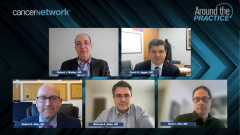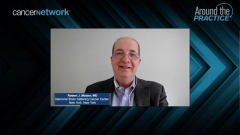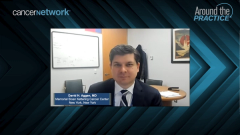
Renal Cell Carcinoma: Future Directions in Care
Closing out their discussion on renal cell carcinoma management, experts highlight unmet needs and look toward the future treatment landscape.
Episodes in this series

Transcript:
Robert J. Motzer, MD: Thank you all for this rich and informative discussion. Before we conclude, maybe each of you can say a few words regarding what you see as the highest unmet need for treatment of RCC [renal cell carcinoma], and share any insight you have into where the field is moving in the future. Brian, your thoughts?
Brian I. Rini, MD: There are still a lot of unmet needs. I’d pick biomarkers, or some way to select patients. Everything we’ve talked about is a very empirical selection based on more bias, practice, and other practical things rather than true biology or science. We’re starting to get better tools to do that with some of the gene expression work that a lot of people on this call have been involved in, but I’m hopeful that over the next 2, 3, or 5 years, we’ll be doing patient-specific therapy and less empirical therapy.
Robert J. Motzer, MD: Thanks very much. Mehmet, what’s your highest unmet need and future direction, in a brief overview?
Mehmet A. Bilen, MD: Overall, the future is bright as we all see. We have better drugs and better combinations, and our outcomes are getting better and better, especially for the clear cell population. Maybe an unmet need is in non–clear cell. We want to have the same momentum and success in this patient population. Hopefully in the near future, you’re going to change the landscape for patients with non–clear cell RCC.
Robert J. Motzer, MD: Thanks very much. Bob, any closing thoughts?
Robert S. Alter, MD: Two excellent points. Of course, going third means you lose that on your first 2. The need I see is to get out in the community. As where I am, with the discussions of these excellent topics, the clinical trial data needs to get out to the community oncologist. I read a recent survey that the most popular combination that’s still utilized is axitinib and pembrolizumab, which is resistant to looking at the newer data of 3 clinical trials and standard-of-care therapies that may be changing. We have to get this information of the newer data into the community. Community oncologists don’t see this as their primary therapies in their patients. I still think there are potentially a lot of patients who can benefit from the data out there. I agree with Mehmet and Brian with regard to those 2 unmet needs.
Robert J. Motzer, MD: David, final closing thoughts? Last, but not least.
David H. Aggen, MD: The problem of the future, 3 years from now, will be that we’re going to have triplets that are very effective, so we’ll be trying to decide between a doublet and a triplet regimen, which patients we should be escalating, and who’s at the highest risk. Whether that’s with a clinical risk stratification or a sequencing-based biomarker, it’s going to be important. We may end up overtreating some patients who might do very well with the doublet therapy. Brian’s comments are spot on about finding those biomarkers to select the right combinations for the right patients.
Robert J. Motzer, MD: OK, great. Thanks to all the panelists for this insightful discussion. To our viewing audience, thank you for joining us. We hope you found this Cancer Network® Around the Practice program useful and valuable to the management of your patients with RCC.
Transcript edited for clarity.
Newsletter
Stay up to date on recent advances in the multidisciplinary approach to cancer.










































